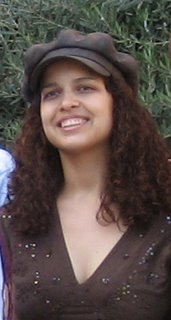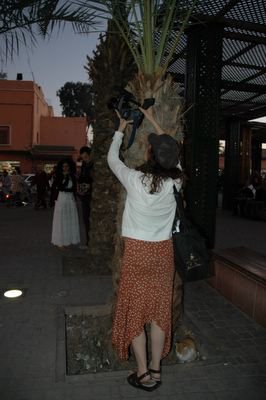Lenina Nadal, Views of Marrakech November 9-28

Here in New York: Mon. Nov. 28th
So, here I am again, back to teaching about Latinos throughout the U.S., the struggles of immigrants here, and conflicts on the border. I'm back to long conversations on my cell phone and the pervading clouds of business and anxiety that I call home. I have a film to finish, lots of footage, waiting for me to come and knit it into a story. When I close my eyes and take a moment I remember the lessons of filmmaking from Marrakech.
My film was on text messages. My first stab at a narrative film. It was quite simple and sappy, with tenderness. It is based on the several messages my boyfriend and I had been sending to each other. Him, in an AOL office in corporate New York, me, on the streets of horse carriages and motorcycles in Marrakech. It is the mobile, the ability to reach one another anywhere in seconds that keeps the relationship moving as fast as the love notes we send.
My film the first week was on palm trees. Now back in New York, I look at the footage and wonder when I will get an Arabic translator, and a moment to discover the stories in my footage. The thought excites me. I am filled with sadness at the end of this journey. But like Kiorostami's roads, if you travel on them long enough, they tend to wind, bend, intersect and if you are lucky you find a new place and if you are lucky you end up right back where you started.
Sunday Nov. 13
Our second day with world renowned director Abbas Kiarostami has led to further investigation of the simplicity of cinema. We have learned that great cinema is a process of stripping away to the core. Some of us began our projects of telling the stories and myths that surround the life of the mobile phone, a technology that through its flight and portability has transformed the essence of how we communicate. Cell phones need to be taught a protocol for etiquette. From mobilizing flash mobs for street protests to romances over a text message, they have built paths and roads on invisible waves of light. We also discussed Kiarostami's poetic piece on the threat of nuclear devastation entitled Roads of Kiarostami. Many of us were mesmerized by the images of winding roads up mountains, the contrasts between light and dark, the bristling of the trees which came alive through subtle dissolves and slow camera movements. Kiarostami is teaching us not only to be better filmmakers, but to be better poets, better observers of life and more careful with its representation. It is not enough for the images to please us, they must provoke us, they must captivate us like an old storyteller who shares not only a tale but also a legendary philosophy. It reminds me of a pop song by C&C music factory, we might say, "Things that make you go hmmmm..."
More writing...
Wed. or Thurs, Nov. 9,10th
So, most of us, the students, have been going out with cameras and mics to a place called Jemaa al Fna Square, an old marketplace which mixes the industrial and the modern with the sights and sounds of folk musicians, storytellers and carts of fruits with DVD vendors and reggaeton music. Beggars, magicians, tarot card readers take space and time as carriages roll by. It’s like Times Square in the 1900s.

Today I went shooting with my partner, Nour-Eddine to the Palmerie. The Palmerie is a place in Marrakech where there is no more irrigation, and flies flock to the faces of little children who roam a playground of decaying palm trees. Nour-Eddine and I filmed some of the trees. Some looked like a mother with children, others fell over leaning on a wall of what is being considered the hottest new real estate in Marrakech. When you leave the new city, where we are staying, and begin to travel to the Palmerie, you see the class differences clearly. In the new city, the tourists enjoy the most lavish and majestic scenery I have ever seen, the oriental dream; the gorgeous arches, the rich colorful lemon, golden and pink tiles, waterfalls and spas to bathe. The gardens are as rich as the gated communities in Puerto Rico. And now as they set up for the International Film Festival, I feel like I’m on the set of an Afro centric Puff Daddy video equipped with flowing orange and red material everywhere, red carpets and beautiful people.
But as I drive out to Palmerie, the "Hollywood" splendor peels away and reveals a world that is still unforgiving to the poor. One turn to the left as you enter the Palmerie and you are in the budding Club Med, a corporation holding on deeply to the faith that cheap property will lead to prosperity and soon the poor will just vanish. But if you keep driving you will see the real palmerie. It is a home to many families who will not go anywhere unless pushed. We spoke with one. A man and his family who has lived in the palmerie for 35 years. He has seen the trees flourish with irrigation, then just years later sag in the dirt that resembles cracked skin. He has watched his children suffer, not enough food and water. Yet, like the jibaros (Caribbean countryfolk) alive and imagined, this family served us delicious mint tea and let us into their home without a moment's hesitation.
But then I felt completely alone for a moment. I could not talk to Nour-Eddine or the people because he speaks Arabic to everyone, and I do not know the language. I wanted to do more things but I could not communicate with him, nor him with me. I hate that I cannot understand the language. I have footage of this interview and I don't really know at all what was said. I trust it is interesting, I pointed to " worthwhile" in my French-English dictionary and asked Nour-Eddine if he thought it was worthwhile and he said yes, very much so. The older man told his story or perhaps a story he thought we may have wanted to hear. I don’t know. But his son, a boy of three told me what I wanted to know. He said these trees give us life; they give us leaves with which we make baskets, and fruit to sell and eat. Nour-Eddine smiled. I continued shooting the trees as I had the little children chase me around. La- no, nam-yes, Ana ismi Lenina, my name is Lenina. This is all I can remember of Arabic, so it was hard to speak to the children. Lots of smiles and peek-a-boo games, and blindly letting them show me around their playground. I thought so much of Puerto Rico, I don't care what anyone says, if you grow your children in the countryside where there are trees and animals, big families and little room, they seem happier. They lack the glum faces of five year olds from the Upper East Side whining for new stationary and ipods. These see the trees for what they are, nurturers, givers of life and opportunity, even as they decay, they offer something profound. We sat in a circle today and I wrote this poem. People liked it when I read it.
I told my professor my one word for Marrakech is spirit
outside my hotel window the palm trees speak French
they try to communicate
because in their story is my blood
but I cannot
because my blood speaks Spanglish
and wants to claim Morocco
reclaim Morocco with my name
the people say I look Moroccan
but I can only say shukran, waha, bonjour, laila saida, merci
I carry words in my backpack and seek their roots
The first day I was here a woman took the back of my palm without permission and drew a henna flower, it means good luck, the end of grieving, the beginning she said and then, not so kindly, said PAY ME in perfect English,
her son tugging at my skirt, me too!
This same type of pull makes me follow the truth of the Moroccan palm trees. limada- why? limana- why not?
I bite my hair when nervous, need to connect to the roots
merengue comes from North African dance, drums and hips I know too well,
the women here look and dance like me, hug like me.
Something in
Morocco is the roots
Some say fear the trees- this is where the spirits of the dead hide
fear the children near the trees because they are too close to the world of spirits,
fear the old, because they will soon enter back and begin a new
fear the trees
but they keep me up at night with their voices!!
Beg me, tug at me like the henna vendor to tell their story
and as a documentarian I will listen, not to the language but to the smiles, to the eyes, to the playfulness of the trees and those people who still live beside them, taking them in like an old grandmother who cannot speak or walk, who may seem worthless, but the children see as a precious jewel.
I cannot fear the trees, I cannot fear this country, because here there is life and life is spirit and spirit is life.

1 Comments:
The Kingdom of Morocco is a country in northwest Africa. It has a long coastline on the Atlantic Ocean that reaches past the Strait of Gibraltar into the Mediterranean Sea. Morocco brims over with contrast, colour and mystery and all you can do is simply catch your breath in wonder. It has a timeless quality that no longer exists in the modern world. And most of all in Morocco I like Marrakech. By having a Marrakech property (also known as Marrakesh) you can experience a mix of the ancient and the modern with the old fortified city and adjacent modern city. Marrakech is home to the largest traditional market in Morocco and the busiest square on the entire continent. Marrakech is an enchanted place where time can still when you want it to while being minutes from the most modern amenities. Marrakech has a vibrant community of discerning European expatriates. There are daily flights to Marrakech from London and Manchester.
Post a Comment
<< Home